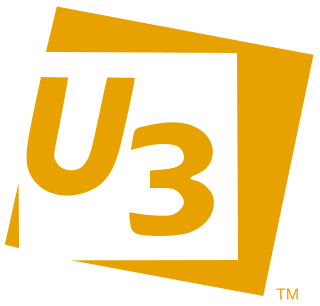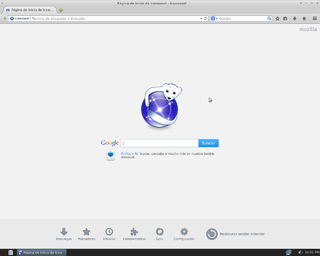A computing platform, digital platform, or software platform is an environment in which software is executed. It may be the hardware or the operating system (OS), a web browser and associated application programming interfaces, or other underlying software, as long as the program code is executed using the services provided by the platform. Computing platforms have different abstraction levels, including a computer architecture, an OS, or runtime libraries. A computing platform is the stage on which computer programs can run.

Knoppix, stylized KNOPPIX, is an operating system based on Debian designed to be run directly from a CD / DVD or a USB flash drive. It was first released in 2000 by German Linux consultant Klaus Knopper, and was one of the first popular live distributions. Knoppix is loaded from the removable medium and decompressed into a RAM drive. The decompression is transparent and on-the-fly.
A boot disk is a removable digital data storage medium from which a computer can load and run (boot) an operating system or utility program. The computer must have a built-in program which will load and execute a program from a boot disk meeting certain standards.

Damn Small Linux (DSL) is a computer operating system for the x86 family of personal computers. It is free and open-source software under the terms of the GNU GPL and other free and open-source licenses. It was designed to run graphical user interface applications on older PC hardware, for example, machines with 486 and early Pentium microprocessors and very little random-access memory (RAM). DSL is a live CD with a size of 50 megabytes (MB). What originally began as an experiment to see how much software could fit in 50 MB eventually became a full Linux distribution. It can be installed on storage media with small capacities, like bootable business cards, USB flash drives, various memory cards, and Zip drives.

A Flash drive is a data storage device that includes flash memory with an integrated USB interface. A typical USB drive is removable, rewritable, and smaller than an optical disc, and usually weighs less than 30 g (1 oz). Since first offered for sale in late 2000, the storage capacities of USB drives range from 8 to 256 gigabytes (GB), 512 GB and 1 terabyte (TB). As of 2023, 2 TB flash drives were the largest currently in production. Some allow up to 100,000 write/erase cycles, depending on the exact type of memory chip used, and are thought to physically last between 10 and 100 years under normal circumstances.
XPInstall is a technology used by the Mozilla Application Suite, SeaMonkey, Mozilla Firefox, Mozilla Thunderbird and other XUL-based applications for installing Mozilla extensions that add functionality to the main application.
Mozilla Firefox has features which distinguish it from other web browsers, such as Google Chrome, Safari, and Microsoft Edge.

U3 was a joint venture between SanDisk and M-Systems, producing a proprietary method of launching Windows software from special USB flash drives. Flash drives adhering to the U3 specification are termed "U3 smart drives". U3 smart drives come preinstalled with the U3 Launchpad. Applications that comply with U3 specifications are allowed to write files or registry information to the host computer, but they must remove this information when the flash drive is ejected. Customizations and settings are instead stored with the application on the flash drive.
The Mozilla application framework is a collection of cross-platform software components that make up the Mozilla applications. It was originally known as XPFE, an abbreviation of cross-platform front end. It was also known as XPToolkit. To avoid confusion, it is now referred to as the Mozilla application framework.

Mozilla Firefox, Portable Edition is a repackaged version of Mozilla Firefox created by John T. Haller. The application allows Firefox to be run from a USB flash drive, CD-ROM, or other portable device on any Windows computer or Linux/Unix computer running Wine. The program does not require Firefox to be installed on the computer, nor does it leave personal information on the computer or interfere with any installed versions of Firefox, however, installation on the computer's data storage device is possible. The program is not totally portable, it can't run multiple instances of Firefox out of the box.

A portable application, sometimes also called standalone, is a program designed to operate without changing other files or requiring other software to be installed. In this way, it can be easily added to, run, and removed from any compatible computer without setup or side-effects.

In 2006, a branding issue developed when Mike Connor, representing the Mozilla Corporation, requested that the Debian Project comply with Mozilla standards for use of the Thunderbird trademark when redistributing the Thunderbird software. At issue were modifications not approved by the Mozilla Foundation, when the name for the software remained the same.

A live USB is a portable USB-attached external data storage device containing a full operating system that can be booted from. The term is reminiscent of USB flash drives but may encompass an external hard disk drive or solid-state drive, though they may be referred to as "live HDD" and "live SSD" respectively. They are the evolutionary next step after live CDs, but with the added benefit of writable storage, allowing customizations to the booted operating system. Live USBs can be used in embedded systems for system administration, data recovery, or test driving, and can persistently save settings and install software packages on the USB device.
MojoPac was an application virtualization product from RingCube Technologies. MojoPac turns any USB 2.0 storage device into a portable computing environment. The term "MojoPac" is used by the company to refer to the software application, the virtualized environment running inside this software, and the USB storage device that contains the software and relevant applications. MojoPac supports popular applications such as Firefox and Microsoft Office, and it is also high performance enough to run popular PC Games such as World of Warcraft, Minecraft and Half-Life 2.

Software remastering is software development that recreates system software and applications while incorporating customizations, with the intent that it is copied and run elsewhere for "off-label" usage. The term comes from remastering in media production, where it is similarly distinguished from mere copying.

PortableApps.com is a website that distributes free applications for Windows that have been packaged for portability. These portable applications are intended to be used from removable storage devices such as USB flash drives.

Porteus is a portable operating system based on Slackware. It does not require installation and can be run from fixed and removable media, such as a USB flash drive or compact disc.
Mozilla is a free software community founded in 1998 by members of Netscape. The Mozilla community uses, develops, publishes and supports Mozilla products, thereby promoting exclusively free software and open standards, with only minor exceptions. The community is supported institutionally by the non-profit Mozilla Foundation and its tax-paying subsidiary, the Mozilla Corporation.












